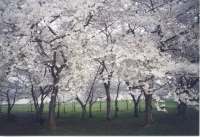She was the first teacher we had that loved books, and loved to read to us. She read Charlotte’s Web, Island of the Blue Dolphin, And Now Miguel, and her favorite, Five Little Peppers and How They Grew.
Until fourth grade my teachers all retired the year after I had them (I’ve always assumed this was a coincidence). But in fourth grade we got a teacher just two years out of college. Mrs. Jordan was quiet, smiled a lot, and had luminous brown eyes. We boys were all mortally wounded by the crush we had on her, even though she was so much older than we were (24, more than twice our age). She was the first teacher we had that loved books, and loved to read to us. She read Charlotte’s Web, Island of the Blue Dolphin, And Now Miguel, and her favorite, Five Little Peppers and How They Grew. She also made us memorize poems. Most of them I don’t remember, although Frost’s Stopping by the Woods on a Snowy Evening was one. The one I can still recite is this one by Housman:
Loveliest of trees the Cherry now

Is hung with bloom along the bough,
And stands about the woodland ride
Wearing white for Eastertide.
Now of my threescore years and ten,
Twenty will not come again,
And take from seventy springs a score
It only leaves me fifty more.
And since to look at things in bloom
Fifty springs are little room,
About the woodland I will go
To see the Cherry hung with snow.
Every spring I remember that line about the Cherry being hung with snow. It is an obvious metaphor, one that can not be missed in northern Virginia. Even now in late April when the dogwoods have taken center stage there are still snow-laden cherry trees to be seen. And when the wind is harsh, and the blossom petals blow, they look like the kind of large flakes that promise good sledding. At the time I memorized it though, what seemed neat to my ten year old mind was the math in the poem. I learned that a score meant twenty, and that there was a different way to count things. It also made sense of the Gettysburg Address.The numerical reference in the poem is not from Lincoln, but from Moses, who says in Psalm 90 that a human life span is roughly 70 years (v.10), and since it is so brief, he asks God to “Teach us to number our days, that we may present to you a heart of wisdom.” One can not be wise who does not understand his own mortality, and how fleeting, how precious it is to see a snow burdened cherry tree. It is amazing to me that Houseman felt the urgency of his own mortality when he was only twenty years old – the age he claims to be in line two of the second stanza.
I found out recently (by doing the math) that Housman wrote the poem when he was thirty-nine. That’s about right. That’s about the time your knees go, and those closest to you start to die off, and you get cancer, and you don’t hurry past every blooming cherry tree because you know that the number left for you to see is finite.
Ecclesiastes, a book that researches the question: “Why are we here?” begins its conclusion with this command:
Remember your creator in the days of your youth. (12.1).
My only desire today is to remind us all, whether we are 20, or 43, or 92 that time is finite, our time is brief, and that gives urgency to our appreciation of His gifts, and our obedience to His commands.

